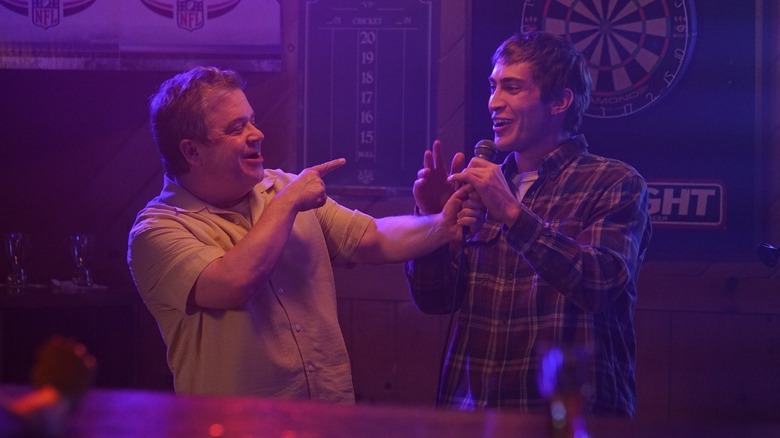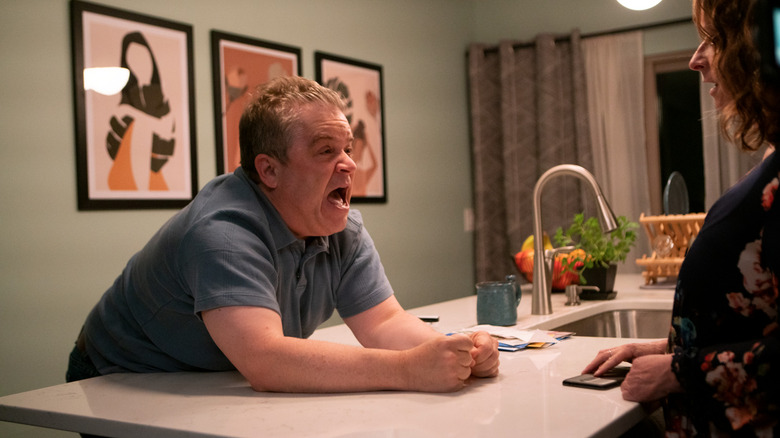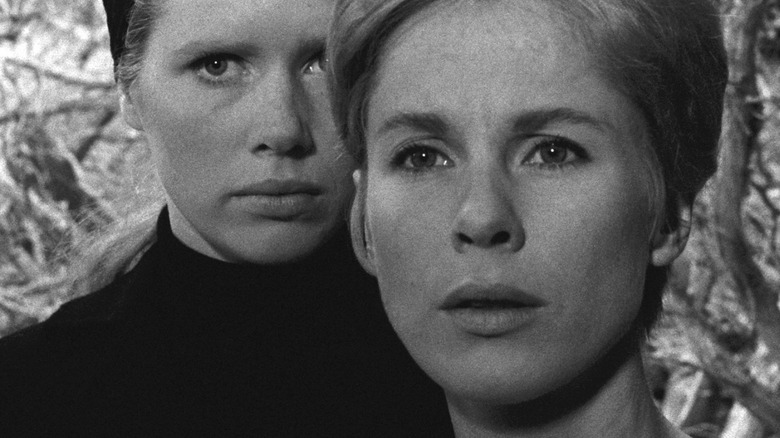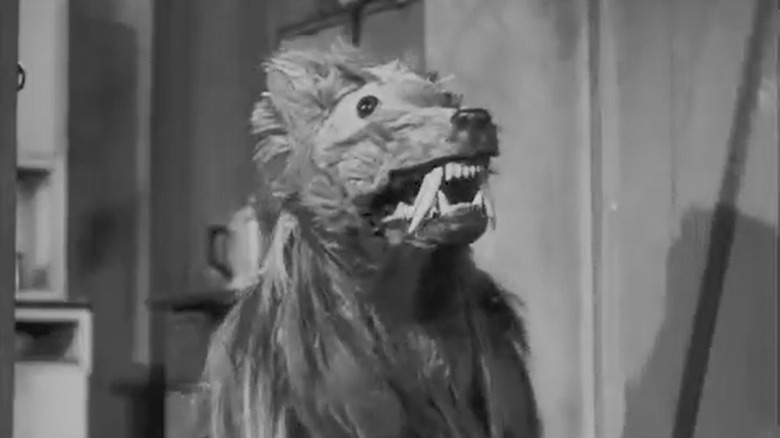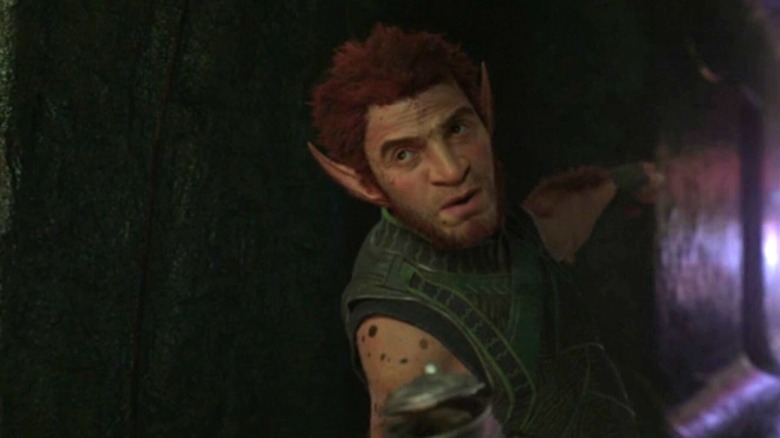Patton Oswalt And James Morosini On The Cringe Comedy Of I Love My Dad [Interview]
Magnolia Pictures invited us to speak to the leads of the fun cringe-inducing new comedy "I Love My Dad," namely writer/director/star James Morosini ("The Sex Lives of College Girls") and his co-star Patton Oswalt ("Young Adult," "The Sandman"). The two spoke to us about suburban wastelands, Ingmar Bergman, movie soundtracks, and the determination Morosini had to get the film made. Oswalt also spoke briefly about his role as Pip the Troll in the MCU as well as his directing ambitions.
Also starring Claudia Sulewski, Lil Rel Howery, Amy Landecker, Ricky Velez, and Rachel Dratch, "I Love My Dad" was the winner of the Grand Jury Prize for Narrative Feature at this year's SXSW and is now playing in select theaters. It will arrive on demand on August 12, 2022. Also, be sure to check out Ethan Anderton's review of the film from SXSW!
Here is the official synopsis:
Inspired by writer, director, and star James Morosini's true life experience, "I Love My Dad" follows Chuck (Patton Oswalt), a hopelessly estranged father who desperately wants to reconnect with his troubled son, Franklin (Morosini). Blocked on social media and concerned for his son's life, Chuck impersonates a waitress online and starts checking in with Franklin. But things begin to spiral when Franklin falls for this imaginary girl (Claudia Sulewski) and wants nothing more than to meet her in person, as Chuck has inadvertently catfished his own son.
'They're feeling loneliness amongst this oppressive mundanity'
My brother who still lives in Northern Virginia wanted me to tell you that the biggest dispensary in the state is now in Sterling.
Patton Oswalt: No shi– well, Sterling turned into Houston these last few years. Everything's out there now, it's so huge. Sterling is not the little country town I grew up in, it's a metropolis now.
They waited until you left to thrive.
Oswalt: They waited until I left to open an Alamo Drafthouse five minutes from the house I grew up in!
That does bring up something related to "I Love My Dad," which is that it has this huge sense of suburban malaise running through it. Like, there's a reason Chuck and Franklin are so miserable and empty inside: look at where they are. Nondescript houses, nondescript offices, etc. Can you speak to that feeling?
James Morosini: Oh, man, yeah. I grew up in suburban Massachusetts and that was kind of the feeling. You could kinda be anywhere. We wanted to shoot it in a place where our characters felt like they were kind of looking for something more, in a way. They were feeling a kind of loneliness... They're feeling loneliness amongst this kind of oppressive mundanity, and I wanted to heighten that visually as much as I could throughout.
Oswalt: Wow. Yeah, you know what? Yeah, the production and set designer [created that feeling of] "Oh, this is all there is. There's nothing on the horizon." And that's all there subtly in the background.
Morosini: Yeah, it's the appearance that everything seems fine, but I feel like that's often when things feel the worst is because your internal life is not being reflected in any direction by your surroundings.
'This is just very normal, everyday, ritualistic stuff that you don't even think about'
I love the way the movie creates these outlandish, almost classic cringe comedy situations but it's shot and acted and scored like a straight drama. The tone it reminded me of the most was "Risky Business," and I'm wondering what films you had in the back of your mind as touchstones for how you wanted this to feel?
Morosini: Multiple, really. I wanted the movie to feel, in the beginning, very formalistic and I didn't want to really put any gas on it directorially, I wanted to keep my hands off of it, and just stay out of the way. I thought a lot about movies of the '90s, but also movies like Michael Haneke's movies or Ruben Östlund's movies where there's this intentional stiltedness and it feels like nothing is moving, really. Then, as Chuck gets more and more frantic, I wanted the camera to start to feel more and more frantic and tighter and tighter shots and kind of emulate his inner life more and more. "Uncut Gems" was a movie that we love and talked about as we were making it.
Oswalt: I also just love that there's that idea that this is just very normal, everyday, ritualistic stuff that you don't even think about, then we inject tension into. Movies like "The Celebration" and a lot of Bergman's movies on their surface look like, "Well, this is everyday life just slugging along," but then there's so much tension happening underneath and it keeps building because nobody will acknowledge it. That's what makes it grow.
Morosini: When we finished SXSW, Patton sent me an entire book of every Bergman film ever.
That big black Criterion block the size of a tombstone.
Oswalt: YES! Yes, exactly. That beautiful thing. I was like, dude, go ahead. (laughs)
Morosini: It's maybe the best gift anyone's ever gotten me. It's exactly what I love. I love Bergman now.
'That cue I'm sure shows up in, like, nine other films'
During a very dramatic moment in the film, you use a music cue from a 1950s B-movie called "The Killer Shrews."
Oswalt: That's right, he did! And by the way, I guarantee you that music cue was probably just in their vaults, and that cue I'm sure shows up in, like, nine other films. Just like, "Yeah, throw that in there."
It made me wonder, do either of you have a favorite use of music from an older movie in a newer movie?
Morosini: That's an amazing question.
Oswalt: The one that jumps right to mind is the main motif from "Teenagers from Outer Space" is the main music in "Night of the Living Dead," and it's because it was an archival piece of music that they didn't have to pay for. They were like, "Why did you choose this eerie throwback? Were you making a statement?" And Romero's like, "Didn't cost nothin'. We needed scary music and it didn't cost nothin', we put it in there." It's such a perfect film and such a perfect piece of music for that film.
Morosini: My knowledge is less encyclopedic than Patton's. I'm always blown away by how Patton can just use instant recall of every movie and how it–
Oswalt: James has more of a life than me. So he doesn't really have all this dumb information in my head. (laughs)
'I was willing to make it no matter what'
"I Love My Dad" is exactly the kind of outlandish script that gets high praise in screenwriting competitions or The Black List, and often gets people other jobs but never actually gets made. How did you stay focused on making this film as opposed to simply using the script as a calling card?
Morosini: The script did win a bunch of screenwriting awards, but I wrote it to make it. It was a matter of I knew Patton was going to be perfect to play Chuck. It's weird, when you create something with someone that you have in mind there's a part of you that's like, "I think they're gonna get this," and then when they do it's just thrilling. It was a very personal movie for me to make and I cared deeply about it and I was willing to make it no matter what. I made my first movie for next-to-nothing, and I was willing to do the same with this movie if that's what it took. I'm glad I didn't have to do that, but I would have had it been necessary.
'Every part of your life shouldn't be a function of your art'
Patton, you recently said that you'll be coming back as Pip the Troll in another MCU film. How did all your many years of D&D-ing help prepare you for that role?
Oswalt: "Dungeons & Dragons" is kind of its own thing. I wasn't one of those people that said, "Oh, my D&D playing, I folded that into my writing and into my acting." D&D is a fun pastime with friends. I don't try to tie it in– I think your art should be a function of your life. Every part of your life shouldn't be a function of your art, or you're going to go nuts.
As Stephen King said.
Oswalt: Yes, exactly! I'm totally quoting Stephen King, you keep them separate.
I heard that you actually directed your next comedy special, which makes me think you might be ramping up to finally make good on directing a feature?
Oswalt: I would, definitely, yeah. I'm in the process now. I want to now direct a feature, but directing the special was great, was really fun.
Do you have one particular pet project you've been curating or are you simply waiting for the right opportunity?
Oswalt: Not right now. I'm waiting for it to hit me.
